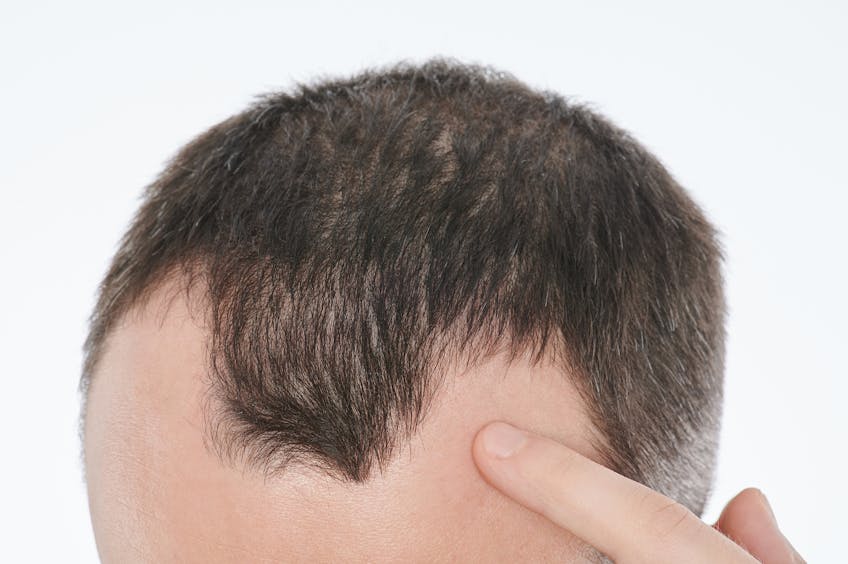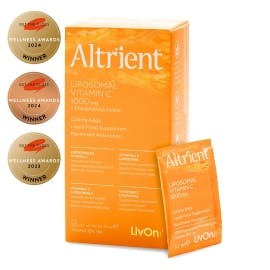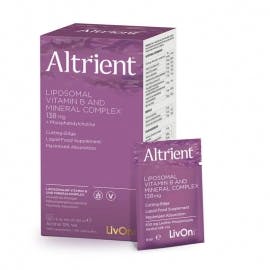Could nutrient deficiencies lead to hair loss?
Hair growth
The hair follows a natural hair growth cycle, a set pattern of growth, rest and shedding through life but this process slows down as we age. Hair is made from a protein called keratin and is built by cells that are very similar to those found in the skin. Blood capillaries surrounding the hair follicles deliver nutrients required for hair growth and unless this process is properly replenished then hair growth may be drastically affected. Hair loss is thought to result from ageing, genetic predisposition, thyroid imbalance, eating disorders, hormone imbalance and of course, stress.
Probably the main hair related concern is hair loss, it is more common in men, but women may also be affected. Hair loss, known as alopecia, may occur following illness or as a side-effect of medication, particularly chemotherapy and other factors include anaemia, infections, hormonal problems and shock or prolonged stress.
1. Hormone balance
Signs of thinning hair may indicate an underlying condition relating to a possible hormone imbalance which contributes to hair condition and growth. Hair loss in women is often linked to hormonal changes and commonly the menopause may have the biggest impact. Hair does tend to thin with age and falling levels of oestrogen in women and testosterone in men tend to impact on the hair follicles, causing mild to severe thinning.
With male pattern baldness, the process is gradual, usually starting with a receding hairline and/or a thinning of the hair at the crown. One contributing factor is believed to be high levels of dihydrotestosterone (DHT), a form of testosterone made by the enzyme 5-αlphareductase. In some men the hair follicles are oversensitive to DHT which creates a gradual thinning of the hair shaft and a shrinking effect for hair follicles.
2. Stress and circulation
Smoking and stress may be very impactful on the growth and condition of hair. Alopecia areata is often associated with stress or trauma and results in sudden and generally temporary loss of patches of hair, but sometimes it may still lead to total hair loss. During prolonged stress the circulation to the scalp may be restricted which could have a knock-on effect of possible undernourishment to the hair root and a tendency towards hair loss. Finding ways to reduce stress along with scalp massage are important and improving exercise may also help to address circulation to the scalp.
Vitamin C supports the cells against oxidative stress which often becomes heightened during times of stress or for those who smoke. Introducing vitamin C rich foods into the diet such as colourful fruits and vegetables including berries, sweet peppers, citrus fruits and dark green leafy vegetables may help protect body cells from oxidative stress. Vitamin C is an essential nutrient for collagen production which is important for the normal health of capillary walls which supply blood to the hair follicles so supplementing with a liposomal form of vitamin C would also be recommended.
3. Diet and nutrient deficiencies
A healthy diet which is low in saturated fat and provides plenty of fiber from fresh fruits, vegetables and wholegrains is now being considered to have a potential role in inhibiting age-related hair loss. Key nutrients which help support good hair condition and normal hair growth include biotin, selenium and zinc. Yet researchers continue to highlight several nutrients to be important for hair health…
Iron – an iron deficiency (low serum ferritin which reflects iron stores rather than iron levels in the blood) is a common nutritional contributing factor for hair loss. Red meat, white meat and fish provide an excellent source of iron but with the new move towards plant-based diets many of us may not be acquiring enough iron from a vegetarian or vegan diet. Plant foods such as lentils, beans and spinach contain iron and the absorption of iron is enhanced in the presence of vitamin C. Low iron status may also be relevant for women who suffer from heavy or prolonged periods, so a contributing factor for women with thinning hair.
Supplementing with a gentle form of iron at the same time as a taking a good quality vitamin C supplement such as Altrient C may be a helpful strategy for vegans and women of a menstruating age. Interestingly, studies show that when combining iron with an amino acid called lysine, women were more likely to reach their target ferritin levels and were more likely to see positive results for hair volume.
B-vitamins – cereals, grains, nuts, seeds and pulses are good sources of the B-vitamins which help build resistance to stress. One B vitamin called biotin is known to help contribute to the maintenance of normal hair. Liposomal Altrient B Complex contains biotin alongside the whole family of B-vitamins, which also contribute to energy production, mental performance and mood. This formula also contains zinc and selenium which also contributes to the maintenance of normal hair.
Changing the diet and supplementing with the natural remedies mentioned may help to slow hair loss down but your lifestyle is important too. Stopping smoking, increasing exercise and finding ways to alleviate stress are all an essential part of holding on to your hair.
References
- Schmitt, J. V., Ribeiro, C. F., Souza, F. H. D. M. D., Siqueira, E. B. D., & Bebber, F. R. L. (2012). Hair loss perception and symptoms of depression in female outpatients attending a general dermatology clinic. Anais brasileiros de dermatologia, 87(3), 412-417. http://www.scielo.br/scielo.php?pid=S0365-05962012000300010&script=sci_arttext&tlng=es Accessed 17.5.19
- Hu, H. M., Zhang, S. B., Lei, X. H., Deng, Z. L., Guo, W. X., Qiu, Z. F., ... & Duan, E. K. (2012). Estrogen leads to reversible hair cycle retardation through inducing premature catagen and maintaining telogen. PloS one, 7(7), e40124. https://www.ncbi.nlm.nih.gov/pmc/articles/PMC3390338/ Accessed 17.5.19
- - Moeinvaziri, M., Mansoori, P., Holakooee, K., Safaee Naraghi, Z., & Abbasi, A. (2009). Iron status in diffuse telogen hair loss among women. Acta Dermatovenerologica Croatica, 17(4), 0-0. ADC_2009_475.PDF Accessed 17.5.19
- Le Floc'h, C., Cheniti, A., Connétable, S., Piccardi, N., Vincenzi, C., & Tosti, A. (2015). Effect of a nutritional supplement on hair loss in women. Journal of cosmetic dermatology, 14(1), 76-82. https://onlinelibrary.wiley.com/doi/abs/10.1111/jocd.12127 Accessed 17.5.19
- - Banihashemi, M., Nahidi, Y., Meibodi, N. T., Jarahi, L., & Dolatkhah, M. (2016). Serum vitamin D3 level in patients with female pattern hair loss. International journal of trichology, 8(3), 116. https://www.ncbi.nlm.nih.gov/pmc/articles/PMC5007917/ Accessed 17.5.19





